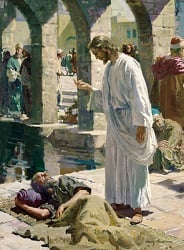Wednesday: A Time for Healing
(Luke 13:16)
When God created the world, He pronounced that everything was very good (Gen. 1:31), no doubt perfect in every way. However, with the advent of sin the creation has been corrupted with evil, an impact seen everywhere. Humans, though created in the image of God, became subject to sickness, deterioration, and death. We often say that death is part of life; death, though, is the negation of life, not part of it. Death was never meant to be something that we experience.
Given God’s original plan for humanity, it is no surprise that some of Jesus’ most dramatic healing miracles took place on the Sabbath.
Review the Sabbath-healing stories in Mark 3:1-6, Luke 13:10-17, John 5:1-9, 9:1-14. What lessons do these miracles teach about the true purpose of the Sabbath?
Each of the Sabbath-healing miracles is spectacular and serves to demonstrate the true meaning of Sabbath. Before Jesus healed the man with the withered hand (Mark 3:1-6), He asked the rhetorical question, Is it lawful on the Sabbath to do good or to do evil, to save life or to kill? (Mark 3:4, NKJV). If a person has an opportunity to relieve suffering on the day of liberation, why shouldn’t he do it? In fact, the miracle with the woman who had a bent back powerfully demonstrates the liberating purpose of the Sabbath (Luke 13:10-17). When criticized for the healing, Jesus asked, Then should not this woman, a daughter of Abraham, whom Satan has kept bound for eighteen long years, be set free on the Sabbath day from what bound her? (Luke 13:16, NIV).
The theme of liberation is also present in the accounts of the healing of the man by the pool of Bethesda who had been sick for thirty-eight years (John 5:1-9), and the healing of the man born blind (John 9:1-14). In response to the Pharisees’ charge that Jesus broke the Sabbath with His healing miracles, He reminded them, My Father is always at his work to this very day, and I, too, am working (John 5:17, NIV). If God did not allow the healing, it would not have happened. When it comes to relieving human misery, God does not rest.
What should we learn from the mistakes of these religious leaders about how preconceived notions can so blind us to even the most obvious of truths?


There are different forms of healing i.e healing of body/mind and spirit. When Jesus walked this earth he proformed many miracles and on the sabbath day as mentioned, he did miracles of healing. He leave the disciples with his example of what is expected of them as they take the message to all the ‘then world’. We in 2014 are given the same command. As Gods’ people, while we go to the hospital to be seen by a train personel, healing can also take place anywhere. Jesus showed us that healing can be done on the streets, in church or any other places. My question is; do anyone knew if hospitals existed at that time? The bible mentioned Luke as a doctor.
In the time of Jesus And the apostles the world witnessed true healing. Should I still believe the healing that is up to date in fellowships to be this true?
Anthony,i believe the same God who performed miracles in the days of apostles is the same God Who can wrought us with the healing powers. As an adventists,I believe we perform miracles, though,the result might not be instantenous according to the popular belief of the most majority, we pray and leave the results with God. On the contrary, as Adventists, we should be careful not to believe a lie.Most of the healings from Pentecostal revival churches are based on dark agents that lack the power of God
The lesson mentions GOD working to relieve suffering daily, including Sabbath. Surely physical illness isn’t the only kind of suffering that we should be concerned with. Again, I refer to Isaiah 58 where GOD says the Sabbath HE has chosen involves feeding the hungry, clothing the naked, sheltering the homeless, and standing up for the oppressed. We Adventists have a bad habit of measuring our spirituality by our inactivity on the Sabbath when, instead, we should be doing the exact opposite.
Well, the less you do, the less likely you are to sin by breaking the Sabbath. You can literally plead: “I didn’t do anything!”
I honestly think that’s the reasoning.